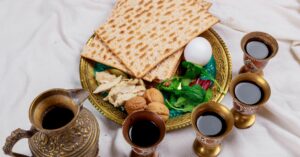A favorite movie around my house is “My Big Fat Greek Wedding.” Anyone who knows me knows that I married into the Greeks. There are so many things in this movie that are accurate, and I didn’t realize it until I was married into it. The first thing that I noticed was how proud the Greeks are of their culture. There were things that I didn’t understand, but when I asked my wife about them, she would explain why they did things the way they did. It was a cultural thing. I remember asking my wife, “Why do they break plates?” and her explanation was, “They just do… It’s like a celebration.” Some people would tell you they believed it would ward off evil spirits, but that wasn’t what my wife was taught. It’s a cultural thing. Without being in the culture, you miss so much. The act means so much more to them than it would to us.
The Jews are famous for their acts of remembrance. They were commanded to set up festivals as a way of remembering all the things God had done for them. The Feast of Unleavened Bread is set up to commemorate the haste with which the Jews fled Egypt. The Feast of Booths is set to remember their time living in temporary shelters as they wandered through the desert. In all, there are 7 feasts that the Jewish celebrate to remember the things that God has done for them. I have spent time learning a little bit about what these festivals contain, but there is something that I am missing. I am missing the cultural reference. As an example, I know the Passover as it is told from the Exodus description.

I understand how they are to prepare the lamb, and how they are supposed to be dressed, and the other aspects. However, what I am missing is the personal investment. For instance, did you know, during the Sedar when they are doing a remembrance for the passover plague, some families will take a finger and dip it in the wine glass, and they will spill a drop of wine for each plague as they are reciting them. The action is to not only remember what happened to liberate them, but also there was a cost to others.
Without being in the culture, we don’t know about these things. If we are missing this, what else are we missing? I know there are times when I read the Bible, and I have absolutely no idea why they do what they are doing. I don’t know about any of you who are reading this, but I never understood why Abraham would kill a calf and throw a huge feast for the angels I the book of Genesis. This is completely foreign to me, however, when I dig in to find the meaning of this, I see that back in those days, hospitality was ingrained in them. Failure to be a good host could be seen as offensive to your guest, and on the other side of that, if you were a gracious host, it was seen as a sign of respect and status. Likewise, in the Bible, they would often take in a weary traveler even if they didn’t know who they were, and they had a three-day rule. You were supposed to take care of them for at least 3 days before you would even inquire about their business. So, where am I going with all of this?
Jesus came down to this Earth and died for us. Paul tells us in Romans 1:15-17, “So I am eager to preach the gospel to you also who are in Rome. For I am not ashamed of the gospel, for it is the power of God for salvation to everyone who believes, to the Jew first and also to the Greek. For in it the righteousness of God is revealed from faith for faith, as it is written, “The righteous shall live by faith.”Jesus died for us as Gentiles, but without knowing the culture, we are just skimming by, in my opinion. Imagine how much deeper we would be in the faith if we studied our Bibles and understood what was being spoken of. Proverbs 1 tells us, “A wise man will hear and increase in learning, and a man of understanding will acquire wise counsel.” We should want to study our faith, we should want to draw closer to the Lord, and we should WANT to learn all there is. That is why Bible studies are important and should be worked into our daily lives. We should be studying so hard that we acquire first a high school diploma, then a bachelor’s degree, and finally a master’s degree in our faith. This week, I would like you to join me in studying an aspect of our faith. Let’s look at the beginning. The question I have your you is this, “Our nativity often depicts Jesus being born in a barn, however, this might not be accurate. Where was Jesus actually born?” You can leave your answer in the comment section. I look forward to seeing what you learn. As always, I am praying for all of you, and I will see you next time.

As we study it out, Jesus was actually born in a cave. The Church of the Nativity is built above the cave.
That’s interesting! When I was looking into it I saw he would have been born in the animal area in the basement of the house, but that would have had an exit to the outside. I wonder if it is the same thing??